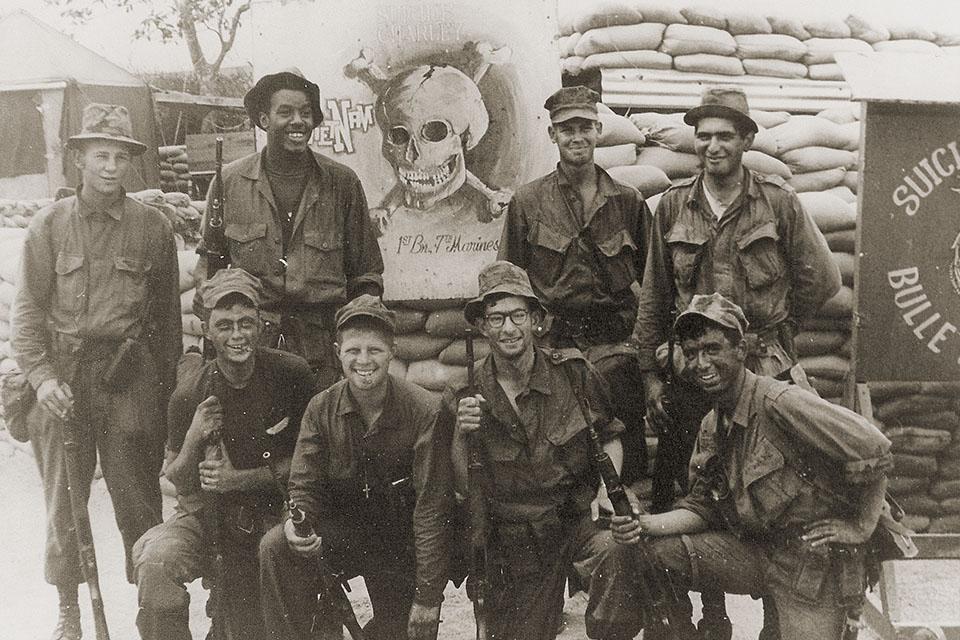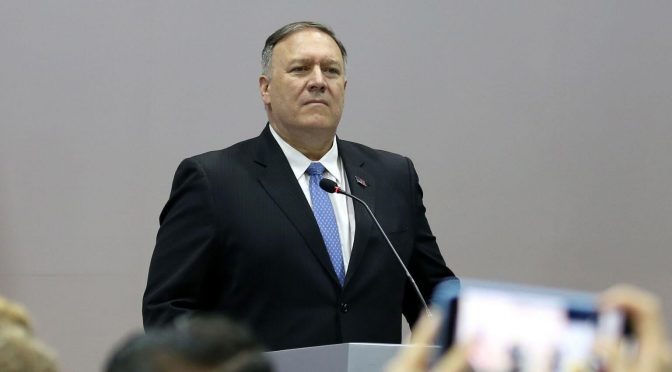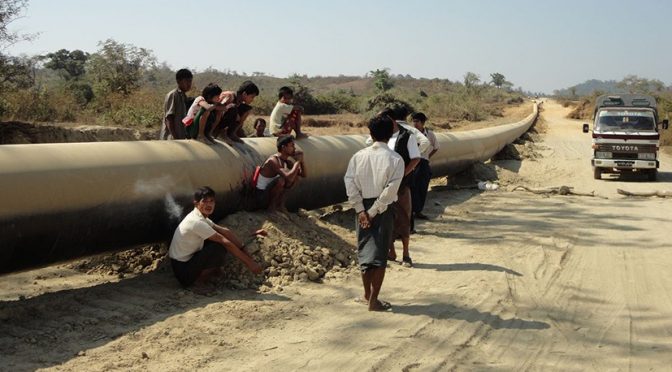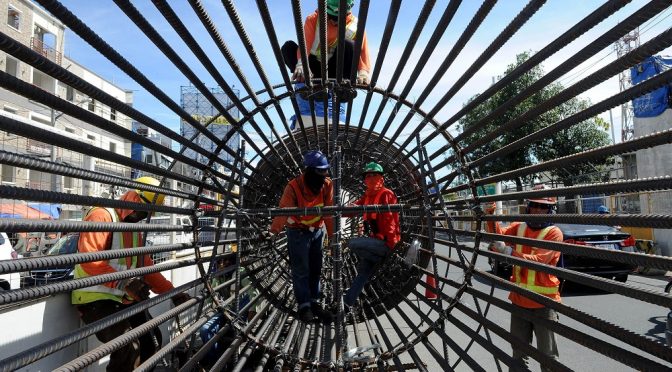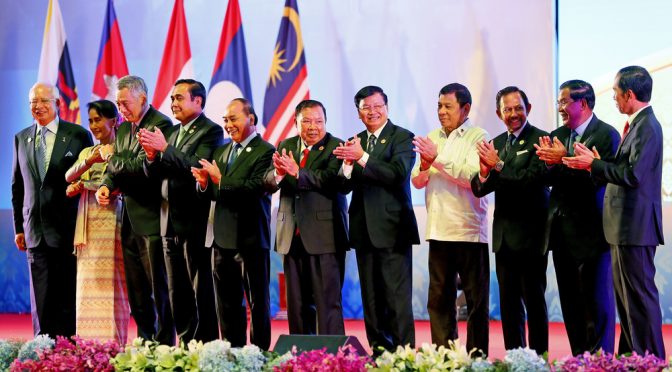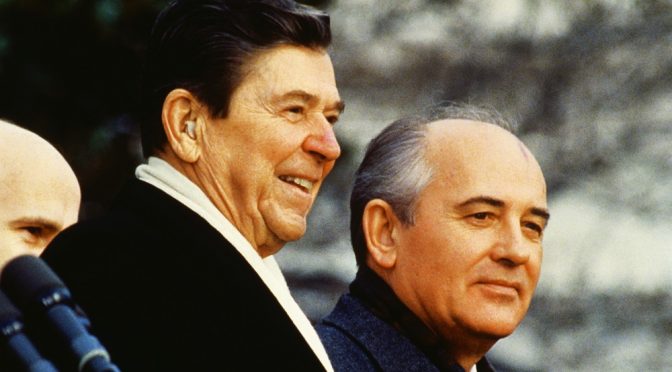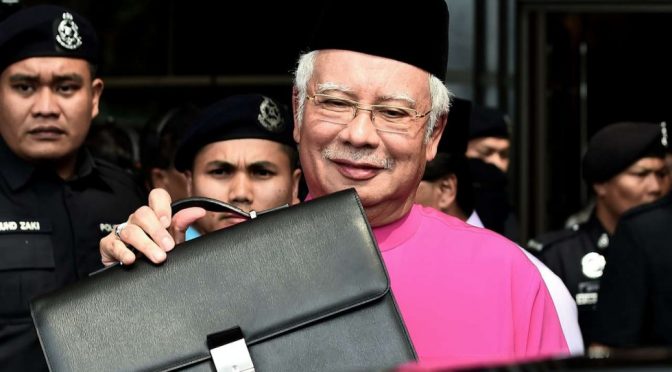Documents passed anonymously to MintPress News reveal the National Endowment for Democracy (NED), a notorious CIA front, is laying the foundations for a color revolution in Indonesia.
Continue reading LEAKED: CIA FRONT PREPARING COLOR REVOLUTION IN INDONESIACategory Archives: ASEAN
The Biggest Vietnam War Story that Americans Don’t Talk About
South Korea’s government is finally being held to account for the carnage its mercenary troops inflicted on Vietnamese civilians. But no one seems to be reckoning with our complicity in the atrocities.
One day after my mother informed my father of her pregnancy with me, he received orders from the US Marine Corps to report to Vietnam. One month later, he was patrolling Quảng Nam Province with a brigade of South Korean Marines nicknamed the “Blue Dragons.”
I’ve long yearned to piece together a story of how the faraway events coinciding with my gestation shattered our family after his return.
The war’s brutality has never been anybody’s secret. By now, the 50th anniversary of the Paris Peace Accords, no aspect of any feature of the conflict would seem to remain unexplored. Yet my boyhood quest to mine the details of what my father did in Vietnam has foundered over the first and most general question: What were South Korean Marines doing there?
A clue tapped me on the shoulder earlier this year. In February, a district court in Seoul ordered the government of South Korea to pay compensatory damages to Nguyễn Thi Thanh, a Vietnamese woman, in a lawsuit she brought over an event that had taken place 55 years earlier, nearly to the day. On the morning of Feb. 12, 1968, about 100 combat troops from the Republic of Korea’s 2nd Marine Brigade poured into Phong Nhị in Quảng Nam Province.
The Blue Dragons set homes ablaze and then proceeded to shoot, stab, drown, and hack to death 70 women, children, and infants. The butchery left no uninjured survivors. Nguyễn, 8 years old, took a bullet to the stomach. The rest of her family perished.
The South Korean government has appealed the verdict, which marked the first time any court in South Korea had attributed culpability for a massacre of Vietnamese civilians.
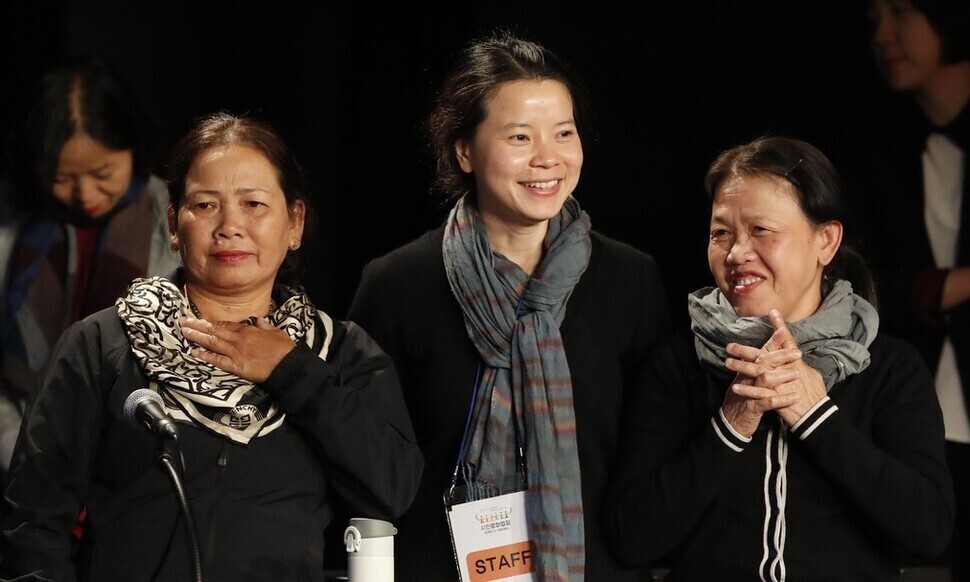
More such lawsuits are likely to be brought. Since 1999, journalists, scholars, and veterans in Seoul have documented more than 80 similar massacres of a total of (at least) 9,000 civilians in three provinces. “There’s a strong sense among the survivors that the problem has to be resolved before their generation passes on,” Ku Su-jeong of the Korean-Vietnamese Peace Foundation said in 2016.
Only a few US news outlets reported Nguyễn’s victory. The silence bespeaks a curious subtraction of memory.
Between 1965 and 1972, South Korea contributed 325,517 combatants at our behest. (Australia’s 60,000 rated the next highest contribution by an American ally. Some 2.7 million Americans served.) South Korean belligerents formed the largest phalanx of foreign fighters in Vietnam other than ours, and they even outnumbered ours in the final two years.
Most Americans today, however, have forgotten the little our predecessors learned about this feature of the conflict at the time. Of tens of thousands of books in English about the Vietnam War, not one is dedicated to South Korea’s participation.
The Vietnam commitment marked the first time in Korea’s 4,000-year history that its fighters left the peninsula to wage war. The American and South Korean governments conspired to make it appear as if these deployments answered a call that came directly from South Vietnam. But in 1970 a US Senate committee detailed a mercenary motive in 2,000 pages of documents appended to its report of hearings into the matter.
Our government footed the entire cost of the South Koreans’ ammunition, aircraft, and weapons, trained and quartered their officers, built barracks for their infantry, and paid bonuses at a rate 23 times as high as their base pay for the duration of the war.
A document called the Brown Memorandum — named for Winthrop G. Brown, the US ambassador to the Republic of Korea — codified the terms of a business transaction. In addition to paying for war materiel and troop bonuses and providing security guarantees against North Korea, our government agreed to purchase all goods and services for the South Korean forces exclusively from South Korean businesses.
The windfall, totaling more than $1 billion, rapidly modernized the country’s heavy industry. Our money contributed 4 percent of South Korea’s gross domestic product and 20 percent of its foreign exchange earnings. President Park Chung Hee, having seized power in a 1961 coup d’état, fortified authoritarian rule in the bargain.
In March 1973, our aircraft removed the last of the South Korean troops to a home country rejuvenated by war profiteering. With its end, President Park turned to formal dictatorship. Western economists have been calling the transformation of South Korea a “miracle” ever since.
Shuffled Off Stage
The South Koreans based their detachment in the Central Highlands, a region thick with enemy forces. The Tiger and the White Horse divisions secured the coast and disrupted supply lines. The Blue Dragon Marine brigade conducted search-and-destroy missions in villages and hamlets. American liaisons such as my father escorted the brigade in the countryside, coordinating helicopter and gunship sup Blue Dragon contingent as “a troubleshooting outfit.”
Some of the trouble they shot had been herded into refugee camps. Survivors reported members of the brigade baiting children into groups with candy and cake and then turning machine guns and grenade launchers against them. Other survivors alleged the Blue Dragons beheaded five children in 1966 and deposited their skulls on a highway as a warning to insurgents.
American newspapers celebrated the florid cruelty of our mercenaries. “Korean Marines are Legends,” crowed the Copley News Service on Nov. 11, 1966, describing them as “larger-than-life figures with dusky yellow skins, high cheekbones, and almond-shaped eyes.” The dispatch quoted US field commanders praising their exemplary methods of terror: “After every fight they skin a few of the dead and leave them behind or cut off their ears and put up their heads on bamboo poles.”
A Scripps-Howard report endorsed the logic of their bloodletting: “Their rough tactics discourage the Viet Cong from attacking them. When Koreans receive fire from a village, they are likely to level it and spread word that the same thing will happen to the next village from which they receive harassment.”
As discipline and morale in our forces wobbled, the South Korean Marines stood firm. The news service UPI extolled them as “one of the toughest fighting units left in Vietnam” in 1971. Their unsentimental ferocity chiseled proof of concept into America’s military strategy. “The ROK Marine pacification program is considered a success,” UPI wrote, “and the corps has gotten over an ugly incident at Barrier Island near Da Nang in which it was reported that many civilians were massacred during a clearing operation.” The next month, as the Blue Dragons began to draw down, their commander, Brigadier General Hur Hong, assured the Los Angeles Times his men’s thirst for blood wasn’t slaked: “Now we would like to go back to Korea and cut off the head of Kim Il Sung.”
This May, as the verdict in Nguyễn Thi Thanh’s lawsuit roiled Seoul, South Korean veterans attended a Vietnam War commemoration ceremony in Washington, D.C. Secretary of the Navy Carlos Del Toro thanked them for their service. To the bare fact of that service, all the most comprehensive and acclaimed histories of the war have given a few grudging sentences, if any.
The latest doorstop, Carolyn Woods Eisenberg’s “Fire and Rain,” appeared this year with an “avalanche of material” declassified in recent decades. Eisenberg omits South Korea entirely. Journalists, novelists, and filmmakers have perpetuated the erasure. The Library of America’s 1,600-page anthology “Reporting Vietnam” affords the subject fewer than 10 words. Ken Burns and Lynn Novick’s documentary “The Vietnam War” runs 18 hours and features interviews with nearly 100 veterans “from all sides.” No South Koreans appear.
Our commentators still tend to interpret the “loss” of Vietnam as a “tragedy,” a fateful concatenation of domestic politics, diplomacy, and military strategy. A rote recitation of the My Lai massacre of 1968 often stands in for the unmentionable fact of many more atrocities committed by US troops. (In 1969, the Pentagon’s Vietnam War Crimes Working Group substantiated 320 massacres and documented another 500 or so allegations.) South Korea’s have been shuffled off stage along with the rest, so that they don’t disturb the dignified musings of tragedy.
The silence deprives us of a framework for the necessary question: What responsibility do we bear for atrocities committed by South Koreans in our Vietnam War? The US Army’s Inspector General found “some probability that a war crime was committed” by them in Phong Nhị on Feb. 12, 1968, the subject of the court ruling in Seoul this year.
“After a limited investigation,” General Westmoreland averred to Lieutenant General Chae Myung-shin, commander of South Korea’s forces in Vietnam, “it was recognized that this matter is more properly a concern of your country, as a signatory to the Geneva Conventions, and our investigation was terminated.” To my knowledge, nobody in a position to do so has ever undertaken a legal or moral inventory of our use of mercenaries in the war.
What my 21-year-old father saw and did with the Blue Dragons he divulged just once, in a private conversation with my mother over my crib. The marriage didn’t last much longer. To his final breath, however, he declined to discuss with me what turned out to be the most important event for both our lives. Maybe he could never find the words to express the meaning of his complicity in extreme violence.
Or maybe he feared I would pity him as a victim of circumstance, denying him moral agency. Either way, the wedge of conscience that separated us never lifted — and cheated us both.
In “Un-nameable Objects, Unspeakable Crimes,” James Baldwin wrote that “the great force of history comes from the fact that we carry it within us, are unconsciously controlled by it in many ways, and history is literally present in all that we do.” Some stories never end. Others never begin.
As US-China Rivalry Boils, Manila Should Play its Cards Well
One must ask how prepared Manila is to weather potential economic reprisals, especially from Beijing.
Continue reading As US-China Rivalry Boils, Manila Should Play its Cards WellMyanmar: Hidden Opposition Violence
As is common with US-backed color revolutions around the globe, the Western media will attempt to cover up opposition violence for as long as possible until shifting the narrative toward a “reluctant civil war” in which opposition groups were “given no choice” but to take up arms.
Continue reading Myanmar: Hidden Opposition ViolenceSoros’ Open Society Staff Arrested & Bank Accounts Seized in Myanmar
The military regime of Myanmar has seized bank accounts of George Soros’ Open Society Foundation [OSF] in the country, as it accuses OSF Myanmar of violating multiple financial restrictions on the activities of organizations interfering on domestic affairs.
As Reuters recently reports,
(Reuters) – The Open Society Foundations, a philanthropic organisation founded by billionaire George Soros, called on Tuesday for the immediate release of a staff member held in Myanmar and said allegations of financial misconduct were false.
State media in Myanmar reported that authorities had detained an official from the Open Society Myanmar and were looking for 11 other employees on suspicion the group passed funds to opponents of a Feb. 1 coup.
“The Open Society Foundations are deeply concerned by reports that an OSM (Open Society Myanmar) staff member has been detained in Myanmar,” Open Society Foundations said in an emailed statement.
“We call for her immediate release. We are alarmed by reports that authorities are seeking to interrogate other staff members.”
Opponents of military rule launched a civil disobedience movement (CDM) of strikes to press the generals to reverse their coup, to free detained government leader Aung San Suu Kyi and to recognise her party’s Nov. 8 election victory.
The military has responded with a crackdown on pro-democracy protests, killing more than 180 people, a human rights group said, while taking legal action against Suu Kyi and others.
The Global New Light of Myanmar newspaper, which has been for years a mouthpiece of the military, said OSM transferred funds without seeking permission from the Foreign Exchange Management Department.
https://www.reuters.com/article/us-myanmar-politics-soros/myanmar-suspects-soros-linked-group-helped-coup-opponents-says-report-idUSKBN2B80V5
Myanmar: Military regime seizes bank accounts of George Soros’s OSF, issues arrest warrant against staff members
OSF Myanmar is also accused of illegally withdrawing $1.4 million from its account at SMED a week after the military junta takeover in Myanmar at the beginning of February. The Military has also seized OSF banks accounts in the private banks of Myanmar, collectively amounting to the tune of $3.81 million.
According to reports from Myanmar, the Myanmar military regime has seized the bank accounts of George Soros’s Open Society Foundation (OSF) in the country. The military regime in Myanmar accuses OSF Myanmar of violating multiple financial restrictions on the activities of organizations like OSF.
The Military regime on Monday announced the arrest warrants for 11 staff members of OSF Myanmar through Myanmar Radio and Television (MRTV). These arrest warrants include the top management of the foundation, with reports revealing the Finance Manager of OSF Myanmar already in detention and going through interrogation since at least Friday.
The Myanmar military junta accuses OSF Myanmar of multiple financial improprieties. The most prominent accusation is a failure to obtain approval from the Central Bank of Myanmar (CBM)’s Foreign Exchange Management Department for depositing US$5 million (7.04 billion kyats) with the Small and Medium Enterprise Development Bank (SMED) in Myanmar in 2018. OSF Myanmar is also accused of illegally withdrawing $1.4 million from its account at SMED a week after the military junta takeover in Myanmar at the beginning of February. The Military has also seized OSF banks accounts in the private banks of Myanmar, collectively amounting to the tune of $3.81 million.
OSF is accused of providing financial support to civil disobedience movements against the military rule.
Military regime accuses Aung San Suu Kyi of meeting George Soros
On March 12th, the Central Bank of Myanmar notified all international and domestic NGOs that all financial transactions since April 1st 2016 involving international organizations or individuals from abroad are to be reported to the CBM. This is seen as a move to investigate the finances of organizations like the OSF since the civilian government of the National League for Democracy (NLD), the political party of Nobel Peace Prize laureate Aung San Suu Kyi, rose to power in early 2016. The Military junta also accuses Aung San Suu Kyi of meeting with George Soros four times between 2014 to 2017 and OSF deputy chair Alexander Soros six times from 2017 to 2020 in her capacity as State Counsellor of Myanmar (equivalent to Prime Minister).
The Union Solidarity and Development Party, a Myanmar political party known for its close ties with the military, have accused the Open Society Foundations of attempting to manipulate Myanmar’s politics through its activities in the country. In 2017, a Myanmar lawmaker objected to a ministerial appointment by the NLD government, citing the appointee’s failure to disclose his previous work for George Soros.
OSF responds, calls for the immediate release of staffers
The Open Society Foundations responded to the Myanmar military junta on Tuesday, calling for the immediate release of the OSF staff member currently detained by the junta. “The Open Society Foundations are deeply concerned about reports that an OSM (Open Society Myanmar) staff member has been detained in Myanmar. We call for her immediate release. We are alarmed by reports that authorities are seeking to interrogate other staff members,” Open Society Foundations said in an emailed statement to Reuters.
The OSF has also rubbished the Military junta’s allegations of financial impropriety on the part of OSF Myanmar. “Claims of financial misconduct, including that OSM acted illegally by withdrawing their own funds in local currency from the SMID bank, are false. Claims that OSM used these funds for illegal purposes are false. These funds were used for purposes fully within the objectives of OSM.” the Open Society Foundations told Reuters.
The Myanmar Army is in control of Myanmar after staging a coup in the early morning hours of 1st February 2021. According to reports, the Myanmar military’s intervention came after weeks of continued friction between the country’s military, which ruled the country for over five decades, and the civilian government over allegations of irregularities in the 2020 Myanmar General Elections. – https://www.opindia.com/2021/03/myanmar-military-regime-seizes-bank-accounts-george-soros-open-society-foundation-detains-staff/
Soros’ Interest in Myanmar ‘Goes Back to 1987’
Hungarian-American investor and business magnate George Soros has a long record of meddling in Myanmar’s affairs and the Southeast Asian region in general.
Forbes reported in 2007 that Soros was spending $2 million a year, “trying to pave the way for democracy in Burma [Myanmar],” through the Burma Project, kicked off in 1994 and operated by the investor’s Open Society Foundations.
According to the media outlet, “Soros’ interest in Burma [Myanmar] goes back to the fall of 1987,” when protests against the government’s currency reform began. In 1988 Nationwide Popular Pro-Democracy Protests — a series of nationwide demonstrations and civil unrest — engulfed the country. It was then that Aung San Suu Kyi, the leader of the National League for Democracy (NLD) and Myanmar’s incumbent State Counselor, emerged nothing short of a “national icon.”
Speaking to Fortune’s Neel Chowdhury, Malaysian Prime Minister Mahathir Mohamad stated on September 29, 1997 that Kuala Lumpur had “definite information” and “every evidence” that Soros was involved in the financial crisis, adding that the US investor was “not the only one” who fanned its flames.
“In fact, he [Soros] more or less confessed later on that he was involved,” Mahathir highlighted. “He had this idea that by applying pressure on Thailand and Malaysia he could prevent Myanmar from joining ASEAN [the Association of Southeast Asian Nations].”
As the media outlet noted, “Soros was irked that in late July, Mahathir and the other leaders of the Association of Southeast Asian Nations formally ushered Myanmar into ASEAN.”
Why Did Soros Seek to Prevent Myanmar From Joining ASEAN?
“In 1997 when Myanmar joined ASEAN, the US — Soros included — had already been deeply involved in coercing, pressuring, and manipulating Southeast Asian states for decades as a continuation of Western colonialism,” Cartalucci responded.
The geopolitical researcher explained that “Myanmar’s acceptance into ASEAN gave it options, legitimacy, and leverage that the US was attempting to strip away from it just as it does today with nations like Syria, North Korea, or Iran through political isolation, economic sanctions, media campaigns, and covert subversion.”
“Efforts to hinder Myanmar’s membership in ASEAN were intended to deny it a much needed lifeline,” he remarked.
In 2003 a US influential think tank, the Council on Foreign Relations, published a document entitled “Burma: Time For Change” by Burma Task Force, which comprised George Soros, then US Senate Majority Whip Mitch McConnell, National Democratic Institute for International Affairs Director Kenneth Wollack and other political and media figures.
“Recognizing that democracy and the National League for Democracy [NLD] (led by Aung San Suu Kyi) cannot survive in Burma without the help of the United States and the international community, this report sounds a clarion call for change,” a preamble to the document said.
According to Soros-sponsored Media Matters watchdog, for many years the billionaire-linked groups gave grants to media organizations “attempting to disseminate information in defiance” of the country’s government and, for instance, funded Burma News International (BNI), “a network of 11 ethnic media groups,” to conduct own coverage of Myanmar’s 2010 general elections.
Soros’ ‘Mission Accomplished’
In 2015 the US magnate had every reason to declare that his mission was accomplished: during the November elections the US-backed NLD won an absolute majority of seats in both chambers of the national parliament.
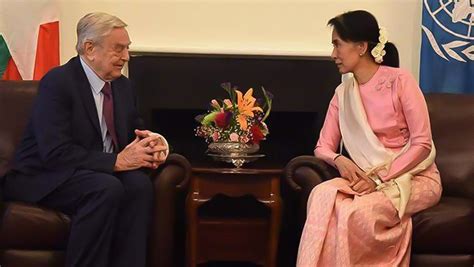
Almost half a year before NLD’s triumph, Soros openly told journalists that his effort in Myanmar was “a longer-term investment that paid off.”
“George Soros is just one of many US-based vectors for cash, political, and operational support attempting to create and install a client regime in Myanmar,” Cartalucci said commenting on Soros’ Burmese saga, “Soros — like the interests he works in concert with — seeks to maximize his power, wealth, and influence. He can do all three by commandeering a nation’s government, its institutions, its natural resources, industry, and influence over its population.”
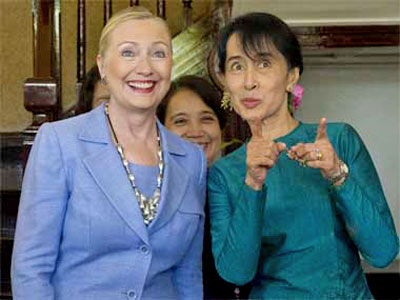
The geopolitical analyst revealed that “Soros’ Open Society Foundation works in Myanmar almost without exception alongside the US State Department’s NED and the vast network of subsidiaries and grantees that it presides over.”
What’s at the Root of US Burmese Policy?
According to Cartalucci, what’s at the root is the US longstanding plan to contain China’s emergence as an influential global player.
Why China’s New South Asian Trade Deal is Making Washington Sweat
A 15-member South Asian trade agreement that includes China and Japan has put the West on notice that its influence in the region is waning and possibly done for.
Continue reading Why China’s New South Asian Trade Deal is Making Washington SweatUS Walks Away from Southeast Asia Summit Empty-Handed
Even if the so-called Q-planned mass arrests of high-profiled pedophiles via the Epstein trial has been effectively retarded with his “apparent suicide” through his cohorts in the intelligence community, the Organized Criminal Cabal is still experiencing global defeat everywhere outside of the United States. Continue reading US Walks Away from Southeast Asia Summit Empty-Handed
Rohingya Crisis, George Soros, Oil & Lessons for India
When George Soros comes to this or that country… he looks for religious, ethnic or social contradictions, chooses the model of action for one of these options or their combination and tries to ‘warm them up’. Continue reading Rohingya Crisis, George Soros, Oil & Lessons for India
Anti-Deep State Gamechanger SCO Doubled its Strength
Behind the preferred headliners of the mainstream media, multiple Eurasia-based geopolitical organizations continue to strengthen themselves away from Western hegemonic influence. Continue reading Anti-Deep State Gamechanger SCO Doubled its Strength
Major Step for Lasting Peace in the South China Sea Has Been Reached
China and the 10-member ASEAN bloc have finally agreed on the “rough outline” of the legally binding Code of Conduct that is seen as a major step to prevent clashes in the highly strategic South China Sea. The COC is expected to be signed when the ASEAN returns to the Philippines for their final summit for this year. Continue reading Major Step for Lasting Peace in the South China Sea Has Been Reached
Deep State is Losing Southeast Asia, Choosing Mutual Economic Progress instead of War
During the next five years, or at least, during the term of the Philippine strongman Mayor Rodrigo Duterte, no attempt at sowing acoustic and kinetic conflicts will be allowed in the South China Sea region. Continue reading Deep State is Losing Southeast Asia, Choosing Mutual Economic Progress instead of War
ASEAN2017 Chair Duterte Defies Western Line of Invoking UNCLOS Ruling vs. China
The current chairman of the ASEAN Summit 2017, Philippine President Rodrigo Duterte, is defying Western pressure to invoke the Hague Tribunal UNCLOS ruling that is aimed at controlling China’s energy and trade route in the South China Sea. Continue reading ASEAN2017 Chair Duterte Defies Western Line of Invoking UNCLOS Ruling vs. China
Russia is Now betting on Asia Due to Perennial Western Double-Cross
When Mikael Gorbachev shook hands with Ronald Reagan to “tear down the wall,” it was with the understanding that the US would not attack Russia in any form, in the future. Continue reading Russia is Now betting on Asia Due to Perennial Western Double-Cross
We Want the Problem, Now You Sort It Out | US @SCS
First the Golan Heights, now the South China Sea – The United States used to patrol this regularly to ensure “freedom of navigation” for all the nations who claim part (or all) of the sea and the islands within it. Now it is being reported that it has called its aircraft carriers home and left the competing states to sort it out for themselves: hoping, of course, that they won’t. Continue reading We Want the Problem, Now You Sort It Out | US @SCS
Malaysia Pivots to BRICS; Soros Plans Color Revolutions in Southeast Asia
Malaysian Prime Minister Najib Razak visits China, barely a week of Philippine President Rodrigo Duterte’s visit.
Malaysian Prime Minister Najib Razak’s week-long visit to China will start October 31. Will it mark a turning point for Malaysian foreign policy, similar to the one recently made by President of the Philippines Rodrigo Duterte?
Continue reading Malaysia Pivots to BRICS; Soros Plans Color Revolutions in Southeast Asia



